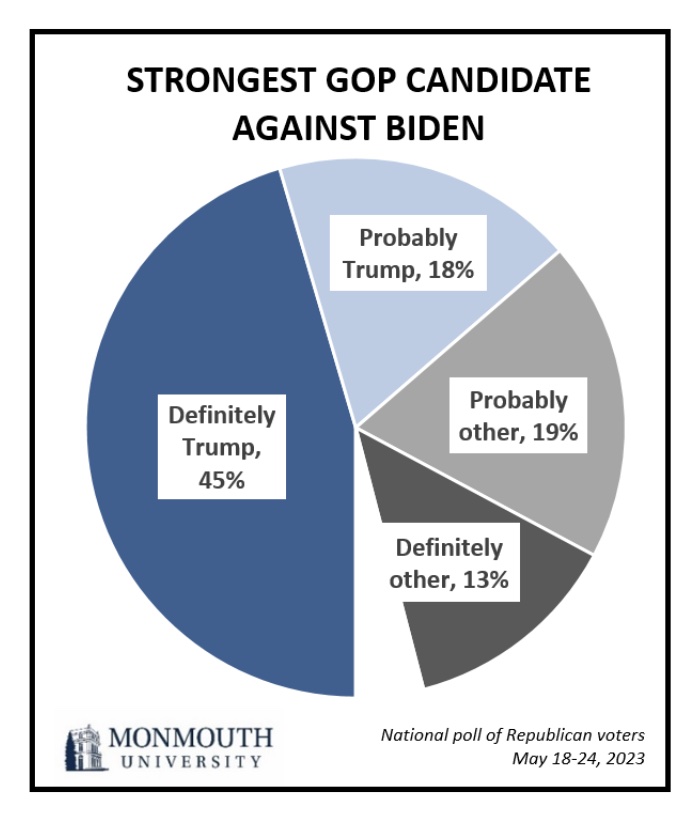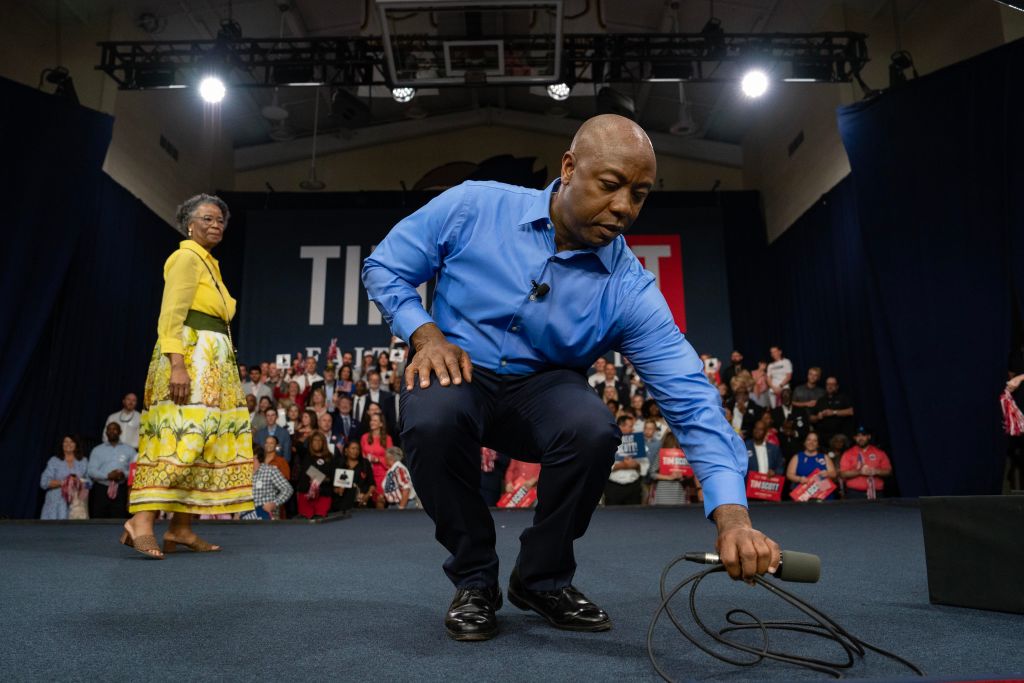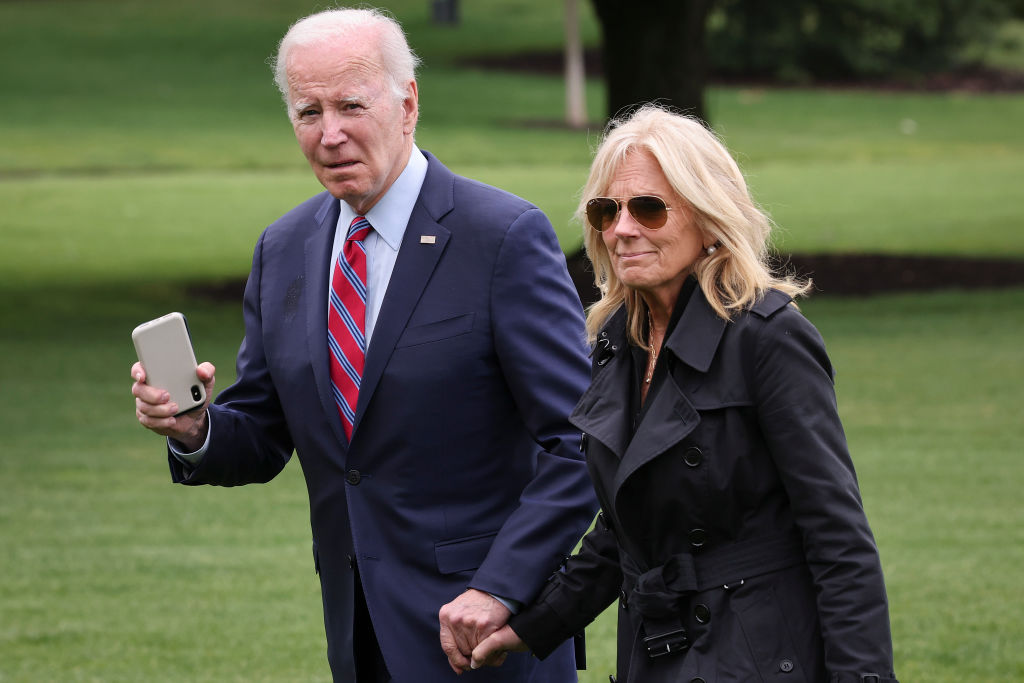This week has been a pretty good microcosm of President Biden’s term so far.
He beat expectations by delivering a bipartisan deal to lift the debt ceiling and saw a boffo jobs report that, while showing some cooling in the red-hot hiring market, still reflected the best numbers since the initial post-pandemic hiring spree.
The once far-fetched-sounding idea that economic growth could outlast inflation is by no means assured, but it is at least now very much in the realm of the possible. And with a deal in place to avoid the chance of another debt crisis until after the 2024 election, that’s at least one recession trigger off the table for Biden.
But, the president also collapsed like a mudslide onstage at the Air Force Academy graduation, a fall that provided a photo and video that would make anyone wince. Worse, it came on the day when Biden was supposed to be taking a victory lap on his deft debt deal. The commander-in-chief-struts storyline turned into elderly-president-claims-no-injuries-from-fall.
Woof.
And there you have the Biden dilemma: Every time you think that the advantages of incumbency will assert themselves, Americans are reminded that he is not just very old, but old and unsteady. No matter how much Team Biden wants to emphasize his cagy negotiating skills and mastery of the legislative process, the lasting effect of the week in the memories of voters will more likely be of the president on his hands and knees again.
They will be embarrassed both for him and by him.
How much that matters, though, will depend on many things. First, will the Republican nominee seem more dangerous than even having a president who dodders? Donald Trump brazenly tried to steal a second term in office, but Republicans seem increasingly unbothered by the prospect of returning him to power. Democrats are betting that the fears of Trump’s lawlessness will exceed those about Biden’s haplessness. Maybe so, maybe not, but it’s certainly the best shot for such a weak incumbent.
Whether the lasting consequence of Biden’s week is a very public fall or a privately negotiated debt deal depends mostly on how the economy looks at this time next year.
Biden is entering what history tells us will be the most crucial phase of his presidency when it comes to public assessments of his handling of the economy, which have, to this point, been very, very terrible. The dominant story of Biden’s term in office hasn’t been Ukraine or the border or China. It’s been inflation, and he’s been flunking the test in the minds of huge majorities of voters.
His best moment to change—or have events change for him—that perception is coming up, but it won’t last long.
There is lots of evidence to suggest that when it comes to voters’ estimates of the economy, “retrospective, rather than prospective, judgments appear to have the more significant impact on the vote at every level.” That’s particularly true when there is an incumbent running for reelection.
That doesn’t apply to the entirety of a president’s term, though. There’s reason to think that voters have a narrower window in which they reach their conclusions about the economy and the president’s performance in dealing with it.
While voters might think they are grading an incumbent over his entire four years, unavoidable human recency bias and media coverage combine to place extra emphasis on the second half, the period after the midterm elections. But not the whole way to the next election. There’s a limit on the power of new information to persuade.
As one researcher behind a widely cited study put it: “Voters do not react only to very late economic events or to what happens over the entire election cycle, but that they respond equally to developments during the last two years of a presidential term.” And there’s some logic to that.
Presidents tend not to get as much credit or blame for what happens in the economy during the first two years, a time when good or bad times are seen as an inheritance from their predecessors. But once those opinions take shape, they set firmer than plaster. Changes in real economic conditions, good or bad, in the final six months or so before the election, may not dislodge the previous conclusion.
Maybe the most famous example was George H.W. Bush’s experience in 1992. Challenger Bill Clinton was running on a campaign built on James Carville’s “it’s the economy, stupid,” which stood to reason given that the economy had been mired in a recession since 1990. But by the fall of 1992, the recovery was well underway and had recaptured the losses of the previous two years. Fat lot of good it did Bush, though.
This is partly explained by the fact that voters hadn’t “felt” the benefits of the expansion in their own lives yet. But it’s also that people had made up their minds about Bush and the economy.
If Americans pull off the feat of whipping inflation without cratering the economy after a spending spree as large as the Trump-Biden coronavirus stimulus orgy, Biden stands to benefit handsomely. And in that case, we will look back to his wheeling and dealing with Speaker Kevin McCarthy as an important moment in Biden’s road to reelection.
But if, by the time next summer starts, Americans still think Biden is the pits on the economy, it will more likely be that tumble we remember.
Holy croakano! We welcome your feedback, so please email us with your tips, corrections, reactions, amplifications, etc. at STIREWALTISMS@THEDISPATCH.COM. If you’d like to be considered for publication, please include your real name and hometown. If you don’t want your comments to be made public, please specify.
STATSHOT
Biden Job Performance
Average approval: 42.2%
Average disapproval: 55.8%
Net score: -13.6 points
Change from one week ago: ↓ 0.4 points
Change from one month ago: ↓ 2.0 points
[Average includes: Fox News: 42% approve-58% disapprove; Monmouth: 42% approve-54% disapprove; NPR/PBS/Marist: 45% approve-49% disapprove; CNN: 41% approve-59% disapprove; CBS News: 41% approve-59% disapprove]
Polling Roulette

TIME OUT: AND THEY’RE LIKE, ‘IT’S BETTER THAN YOURS’
The Athletic: “CORAL GABLES, Fla. — Gage Ziehl, Miami’s Friday night starter, snuck a sip at a high school game once. It was Oreo-flavored. Blake Cyr has never tasted one. It’s against the rules. Hurricanes coach Gino DiMare doesn’t allow his players to partake. ‘I heard they’re unbelievable,’ said Cyr, Miami’s All-ACC second baseman. ‘I have friends who tell me they’re coming to the games, but I never end up seeing them. Then, after the game, they tell me, ‘Sorry, I only went for the milkshake.’’ College baseball’s NCAA Tournament gets underway [today] with action across 16 sites, and you’d be hard-pressed to find a concession item sold on-site with a richer history than the Mark Light Shake. … The shakes have been around since 1986 and have come in more than 40 different flavors — not including the infamous ones created in honor of opponents.”
TRUMP RELISHES RETURN TO REALITY-SHOW STYLE CAMPAIGN
AP: “Former President Donald Trump kept up a steady drumbeat of criticism of his chief rival Ron DeSantis on Thursday, jumping immediately on remarks by the Florida governor on the campaign trail to try to highlight his own strength as the leading GOP presidential candidate. Trump, appearing in Iowa as DeSantis campaigned in New Hampshire, made a point of telling about 200 members of a conservative club gathered at a Des Moines-area restaurant that they could ask him questions — an offer that came not long after DeSantis snapped at an Associated Press reporter who asked him why he wasn’t taking questions from voters at his events. ‘A lot of politicians don’t take questions. They give a speech,’ Trump said to audience members, many of whom wore red ‘Make America Great Again’ hats espousing his political movement.”
Georgia probe intensifies: Washington Post: “An Atlanta-area investigation of alleged election interference by former president Donald Trump and his allies has broadened to include activities in Washington, D.C., and several other states, according to two people with knowledge of the probe — a fresh sign that prosecutors may be building a sprawling case under Georgia’s racketeering laws. Fulton County District Attorney Fani T. Willis (D) launched an investigation more than two years ago to examine efforts by Trump and his allies to overturn his narrow 2020 defeat in Georgia. Along the way, she has signaled publicly that she may use Georgia’s Racketeer Influenced and Corrupt Organizations (RICO) statute to allege that these efforts amounted to a far-reaching criminal scheme.”
DeSantis PAC pumps the brakes: NBC News: “The super PAC supporting Florida Gov. Ron DeSantis’ presidential bid has dramatically scaled down its ad spending in recent weeks. … Through May 15, Never Back Down had spent $10.8 million on the airwaves, compared to MAGA Inc.’s $10.2 million. But the dynamic has shifted dramatically since then. From May 16 through the end of the month, Never Back Down spent just $22,000 on ads, while MAGA Inc. spent another $5.4 million. … Never Back Down’s ramping down directly corresponds with the drumbeat of activity surrounding DeSantis’ presidential launch. … All of the MAGA Inc. spots from the month, meanwhile, are primarily critical of DeSantis, attacking him on taxes, entitlements and more.”
But bets big on Iowa: Washington Post: Here in Iowa, which will kick off the GOP nominating process next year, a [Trump] victory is far from assured, according to interviews with local lawmakers, strategists and voters. … The super PAC backing him has been showering money and attention on Iowa, rounding up endorsements by state legislators, hiring experienced operatives, sending out flashy mail pieces, organizing events and starting to build a field operation. … DeSantis advisers have told donors they view Iowa as especially promising for the governor, and DeSantis has said he plans to campaign in all 99 of the state’s counties. … In addition to evangelicals, [Steve Deace] said a significant community of Iowa Republicans who oppose vaccines and hold Trump’s pandemic policies against him, which could endear them to DeSantis’s shift in opposition to covid shots.”
Hawk-eyed Pence set to join race: NPR: “Former Vice President Mike Pence plans to announce his campaign for president on June 7 at an event in Des Moines. … In the past several weeks Pence has previewed a campaign focused on returning the Republican party to traditional GOP themes. … He has also made more pointed attacks on Trump, his former running mate, by invoking his own faith and family values and promising to respect the constitution.”
Ernst plays home-state kingmaker: Politico: Iowa Sen. Joni Ernst “is stepping into a central role as her state becomes ground zero for a fight to define the GOP’s future. … On June 3, she will host the Roast and Ride, an Iowa cattle call that takes place partly on motorcycles and features several top-tier presidential primary contenders. … With the presidential contest heating up, Ernst may yet face more forks in the road. … Ernst could easily find herself on the 2024 nominee’s short list, and she isn’t slamming that door. … Ernst is in a tricky spot as a rising Republican leader from an early-voting state who is focused on broadening the party’s tent. … And when she talks about the new day she wants to see in the GOP, her vision doesn’t exactly sound like another Trump presidency.”
Christie could be Trump’s toughest critic: Axios: “Former New Jersey Gov. Chris Christie is expected to announce his 2024 Republican candidacy for president next Tuesday in New Hampshire. … Christie, 60, is a former close Trump ally who now calls the former president a ‘coward’ and ‘puppet of Putin.’ He gives traditional Republicans a horse — but seems to have a narrow market in today’s GOP.”
ARTIFICIAL INTELLIGENCE, THE GREAT EQUALIZER?
The Atlantic: “Voice-impersonation technology and deep-fake videos are scaring campaign strategists, who fear that their deployment in the days before the 2024 election could decide the winner. … Amid the growing panic, however, a new generation of tech entrepreneurs is selling a more optimistic future for the merger of AI and politics. … In their telling, the awesome automating power of AI has the potential to…dramatically reduce the cost of running for election in the United States. … The result could be a more open and accessible democracy, in which small, bare-bones campaigns can compete with well-funded juggernauts. … Campaigns big and small have begun using generative-AI software such as ChatGPT and DALL-E to create digital ads, proofread, and even write press releases and fundraising pitches. … The adoption of AI may not be such welcome news, however, for voters who are already sick of being bombarded with ads, canned emails, and fundraising requests during election season.”
BRIEFLY
Biden approval craters among black and Hispanic voters—FiveThirtyEight
Abortion slows Wisconsin’s red shift—Politico
Mega-MAGA Majewski drops out of Kaptur rematch—Toledo Blade
Utah Republican Rep. Chris Stewart to resign over family health concerns—Politico
WITHIN EARSHOT: PURPLE HAZE
“It’s gone on longer than I’ve been alive: the prohibition by a plant made by God. … Jimi Hendrix is looking down on Minnesota smiling.”—Former Minnesota Gov. Jesse Ventura praises the state’s recent legalization of marijuana in a press conference with current Democratic Gov. Tim Walz.
MAILBAG
“I last corresponded with you after the midterms where the Democratic-Farmer-Laborer Party cleaned up and assumed total control of state government here in Minnesota. Earlier this week, the legislature concluded their session—and what a session it was. The biggest increase in the size of government since the Minnesota Miracle in the 1970s, with an $18 billion surplus being spent and then some, with a whole bunch of new taxes on the way. Legalizing recreational marijuana, codifying abortion rights, free college if you make under $80,000, expanded gun control; I could go on. In your estimation, is this just an ‘eat, drink and be merry, for tomorrow we die’ situation and the inevitable turn toward conservatism still on the way due to demographic shifts, or is there something else at work? Punditize, man, we need some hope.”—Dan Nimlos, Coon Rapids, Minnesota
Great to hear from you again, Mr. Nimlos! I hereby designate you as this note’s official Minnesota correspondent. Please keep them coming. I think you have in Minnesota a situation very much like the United States as a whole. Democrats rode a very narrow margin—just 321 votes—to their Senate majority. Good government, good strategy, and prudence would seem to commend modest, bipartisan aspirations in such a situation. But instead, Democrats used their moment to jam through a raft of legislation on a variety of issues, including the very sensitive ones you mentioned, as well as big changes to the way the state operates. That’s been the story in Washington since at least 2009, when we started riding a policy seesaw on which parties take turns ignoring consensus, sucking up to their activist core voters, and paying the price two years later. Both parties govern in a way that both assumes and assures their advantages will be ephemeral. The “Minnesota Miracle” you mention is the same one that Gov. Tim Walz has embraced as the template for this scattershot agenda for everything from legal reefer to overhauling the tax code. But it bears little resemblance to the events of 1971, and the reforms passed under newly elected Gov. Wendell Anderson. Republican incumbent Harold LeVander had surprised the state the year before by opting against seeking a second term, opening the way for the ambitious, energetic 37-year-old Anderson. When he took office, the state’s House and Senate were both in Republican hands. The “miracle” was that Anderson and Republicans, after an arduous, sometimes acrimonious, back-and-forth, came up with a bipartisan answer to a question that had dogged the state since the 1950s: How to provide adequate school funding in a system that relied entirely on local property taxes. The status quo led to major educational disadvantages for poor counties and skyrocketing property tax rates in rich ones. Getting enough Republicans to sign off on what amounted to a massive statewide tax hike was no easy task, but it passed and Minnesotans were generally pleased with the results. Anderson would later cause a catastrophe for his party in what was dubbed the “Minnesota Massacre.” He hatched a deal with Lt. Gov. Rudy Pepich in 1976 by which Anderson, reelected in 1974 by a smashing margin, would resign and Pepich would appoint him to the Senate seat left vacant by the elevation of Walter Mondale to the vice presidency. In 1978, already a somewhat unfavorable climate for Democrats, Minnesota voters brutally punished Anerson’s party, turning him out, as well as Pepich. Democrats also lost the other Senate seat, which had been left vacant by the death of Hubert Humphrey. But the accord on schools he had engineered paid dividends for Democrats for decades before and after his Carter-era venality to power. Democrats held the state Senate from 1973 to 2011 and, except for a Reagan-era blip, dominated the House until the turn of this century. Ideologues want structural change. Partisans want victories. To get both requires patience and compromise, not the use of a narrow advantage to ram and jam controversial legislation through. The preferred outlook for most in politics today is that “elections have consequences.” Sure. But not for long if you don’t know how to govern in a way that attracts more than it divides.
You should email us! Write to STIREWALTISMS@THEDISPATCH.COM with your tips, kudos, criticisms, insights, rediscovered words, wonderful names, recipes and, always, good jokes. Please include your real name—at least first and last—and hometown. Make sure to let me know in the email if you want to keep your submission private. My colleague, the learned Nate Moore, and I will look for your emails and then share the most interesting ones and my responses here. Clickety clack!
CUTLINE CONTEST: A PLACE FOR EVERYTHING …

Well, well, well… Cutline contestants kicked off the June edition with a vigor suitable to the start of summer, with an obvious assist from Sen. Tim Scott, and his mother, Frances, and the photo-picking skills of your benefactor, assistant editor Luis Parrales. Our winner, one of the true powerhouses of the game, did three things right: She got her response in quickly, didn’t overlook the obvious joke, and kept it lean.
Winner:
“Tim, please pick up your room. Your friends are about to arrive.”—Linda McKee, DuBois, Pennsylvania
Winner, Real Talk Division:
“Thank you for that GREAT introduction, but folks, I’m not here about mic drops.”—Richard Kennedy, Ferndale, Michigan
Winner, Mini Meatball Division:
“Tim Scott Demonstrates the ‘Tiny Ron DeSantis’ Mic-Drop”—Tribb Whitbeck, Arlington, Virginia
Winner, Russia Gait Division:
“For my next number I will do the Dance of the Cossacks.”—Bob Goldman, Gilroy, California
Winner, Baller on a Budget Division:
“I can’t do a mic drop, it’s rented. I’d never get the deposit back. I just place it right here.”—Brent Hall, Edina, Minnesota
Winner, Hans und Franz Division:
“Lift with the legs, not the back.”—Jared Fuqua, League City, Texas
Winner, Lilliput It Over There Division:
“Now let’s take a moment to hear what the little people have to say.”—David Landry, Lynnfield, Massachusetts
Winner, Making Hiss-tory Division:
“Senator Scott GENTLY lowers the North American spitting microphone python into its preferred coiled resting position, avoiding the often fatal results of overuse.”—Nathan Wurtzel, South Riding, Virginia
Winner, Split Ticket Division:
“Mamma! There goes my pants!”—Mark Swedburg, Natal, Brazil
Send your proposed cutline for the picture that appears at the top of this newsletter to STIREWALTISMS@THEDISPATCH.COM. We will pick the best entrants for each week and an appropriate reward for the best of this month—even beyond the glory and adulation that will surely follow. Be hilarious, don’t be too dirty, and never be cruel. Include your full name and hometown. Have fun!
(UN)SEND NUDES New York Post: “Some drivers are representing the Peach State a bit too literally. Government officials in Georgia are begging residents not to be naked in their driver’s license photos. The Georgia Department of Driver Services requested that people appear fully clothed in the photos used for their digital identity cards. ‘Attention, lovely people of the digital era! Please take pictures with your clothes on… Cheers to technology and keeping things classy!’ … People questioned whether the post was a joke, but the department doubled down, insisting ‘it’s real’ and ‘it’s insane’ with an array of funny memes. … ‘I’m just trynna get out of tickets! Sheesh,’ Kayla Hubbell quipped. … Georgia recently unveiled digital driver’s licenses and IDs that can be uploaded to a digital wallet on select smart devices. The department is in the process of adding DDLs and digital IDs to as many phone manufacturers as possible.”
Chris Stirewalt is a contributing editor at The Dispatch, a senior fellow at the American Enterprise Institute, the politics editor for NewsNation, and author of Broken News, a book on media and politics. Nate Moore and Jae Grace contributed to this report.







Please note that we at The Dispatch hold ourselves, our work, and our commenters to a higher standard than other places on the internet. We welcome comments that foster genuine debate or discussion—including comments critical of us or our work—but responses that include ad hominem attacks on fellow Dispatch members or are intended to stoke fear and anger may be moderated.
With your membership, you only have the ability to comment on The Morning Dispatch articles. Consider upgrading to join the conversation everywhere.